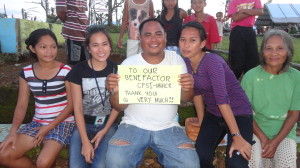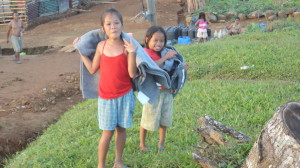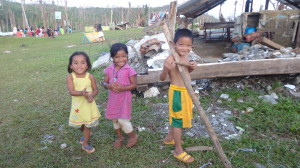By Mary Antoniette Amistoso
Visayas Protection Project, CFSI Field Office Guiuan
The devastating impact of Typhoon Haiyan (Yolanda), which struck the Central Visayas region of the Philippines on November 8, is still being felt by many throughout the region. In the three months since the typhoon hit, we’ve seen countless people literally picking up the broken pieces of their lives; a sometimes gruesome and always heartbreaking sight.
For many – if not all – of the survivors, this has been the toughest times of their lives. It’s hard to imagine how people who have lost almost everything can summon the strength and courage to look forward to a better future. That question can only be answered by speaking to the survivors themselves. This is my story of an encounter with one such person.
 [pullquote]You are the ones who are giving us the strength not to give up and to continue with our lives[/pullquote]Located in the mountainous area of Giporlos municipality in Eastern Samar is the small community of Barangay Santa Cruz; a village that can only be reached by four-wheel drives or motorcycles. It’s one of the sites we visited in January as part of an area assessment, and it’s here that I met Mary Ann Caranyagan, a 22-year-old mother and village councilor.
[pullquote]You are the ones who are giving us the strength not to give up and to continue with our lives[/pullquote]Located in the mountainous area of Giporlos municipality in Eastern Samar is the small community of Barangay Santa Cruz; a village that can only be reached by four-wheel drives or motorcycles. It’s one of the sites we visited in January as part of an area assessment, and it’s here that I met Mary Ann Caranyagan, a 22-year-old mother and village councilor.
I noticed her immediately when we reached the village; she greeted us with a warm smile and tears in her eyes. Curious, I asked her why she had tears. She began to cry, telling me that she was simply happy to see us. She thanked us despite not knowing why we were there and what items we were going to give to the community.
I asked her about the situation they faced and the problems they were encountering, and she told me that one of the greatest difficulties was the lack of assistance they had received, and that only a few aid organizations had been to visit them despite everyone in the community losing everything.
 Their village was completely destroyed in the typhoon; only a few houses remained standing. They were living in makeshift huts made from the leaves of fallen coconut trees; the children were soaking wet, particularly when it rained. It was a miserable situation.
Their village was completely destroyed in the typhoon; only a few houses remained standing. They were living in makeshift huts made from the leaves of fallen coconut trees; the children were soaking wet, particularly when it rained. It was a miserable situation.
When we finished our assessment, we bid them farewell, promising that we would return. And we did, after another five-hour drive from our base in Guiuan. This time we brought with us much-needed tents and blankets, which we distributed to everyone in the community.
 Mary Ann approached me as I oversaw the distribution of the tents, giving me a hug and saying words that made me cry: “Damo nga salamat! Kamo it naghahatag ha amon hin kusog para diri kami sumuko ngahin para ipadayon namon it amon mga kinabuhi, inabat namon nga kaya namon tumindog ngahaw kay kamo it amon guide (Thank you so much. You are the ones who are giving us the strength not to give up and to continue with our lives. We feel that we can rise again because you serve us, as our guide).”
Mary Ann approached me as I oversaw the distribution of the tents, giving me a hug and saying words that made me cry: “Damo nga salamat! Kamo it naghahatag ha amon hin kusog para diri kami sumuko ngahin para ipadayon namon it amon mga kinabuhi, inabat namon nga kaya namon tumindog ngahaw kay kamo it amon guide (Thank you so much. You are the ones who are giving us the strength not to give up and to continue with our lives. We feel that we can rise again because you serve us, as our guide).”
Hearing these words made me realize that being part of CFSI enables you to help those in need; simple words that inspire us to continue with our work – to continue helping these survivors in whatever way we can in order for them to not only rise up, but to rise up stronger.

